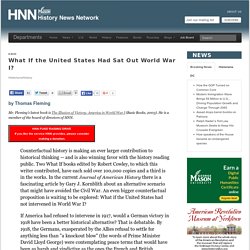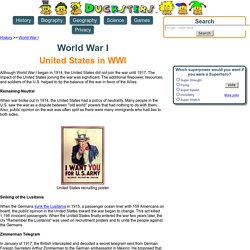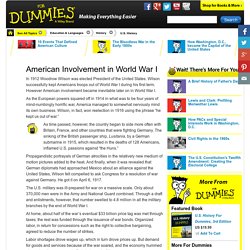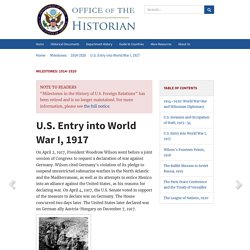

What If the United States Had Sat Out World War I? 6-30-03 Historians/History by Thomas Fleming Mr.

Fleming's latest book is The Illusion of Victory: America in World War I (Basic Books, 2003). He is a member of the board of directors of HNN. Counterfactual history is making an ever larger contribution to historical thinking -- and is also winning favor with the history reading public. If America had refused to intervene in 1917, would a German victory in 1918 have been a better historical alternative? But there is another more promising alternative. As a genuine neutral, Wilson might even have persuaded both sides to let him be a mediator. German aims before the war began were relatively modest. Some people whose minds still vibrate to the historic echoes of British propaganda argue that by defeating Germany in 1918, America saved herself from future conquest by the Hun.
The argument against intervention finds support from an unlikely, little known quarter. Please enable JavaScript to view the <a href=" powered by Disqus. NYGuy - 7/5/2003. World War I for Kids: United States in WWI. History >> World War I Although World War I began in 1914, the United States did not join the war until 1917.

The impact of the United States joining the war was significant. If World War I Was a Bar Fight. Germany, Austria and Italy are standing together in the middle of a pub when Serbia bumps into Austria and spills Austria’s pint.

Austria demands Serbia buy it a whole new suit because of the new beer stains on its trouser leg. Germany expresses its support for Austria’s point of view. Britain recommends that everyone calm down a bit. Serbia points out that it can’t afford a whole suit, but offers to pay for the cleaning of Austria’s trousers. Russia and Serbia look at Austria. Austria asks Serbia who it’s looking at. Russia suggests that Austria should leave its little brother alone. Austria inquires as to whose army will assist Russia in doing so. Germany appeals to Britain that France has been looking at it, and that its sufficiently out of order that Britain not intervene. Britain replies that France can look at who it wants to, that Britain is looking at Germany too, and what is Germany going to do about it? Britain and France ask Germany whether it’s looking at Belgium. America's military power in World War One. America’s entry into World War One was well received by the Allies as her military power was desperately needed on the Western Front after the loss of men at the Somme and Verdun.

The turmoil in Russia meant that Germany could move men based on the Eastern Front to the Western, so a nation of such power as America was seen, by the Allies, as a welcome addition to the cause. In early June 1917, General John Pershing, commander-in-chief of the American Expeditionary Force (AEF), arrived in Britain for a four-day visit before moving to France where he began to organise his command. On arrival in Britain, Pershing was greeted by the king and the ‘London Graphic’ published a photo of Pershing and his fellow officers with the caption “Now is the winter of our discontent made glorious by this sun of (New) York.”
Many did see Pershing and his troops as military saviours. America’s population of 90 million gave the military the potential to have a very large army. How World War I Helped America Rise to Superpower Status. "Sarajevo, 21st-century version.

" This is how political scientist Anne-Marie Slaughter, the director of policy planning under former Secretary of State Hillary Clinton, refers to what is currently brewing off the Chinese coast, where the territorial claims of several nations overlap. American Involvement in World War I. In 1912 Woodrow Wilson was elected President of the United States.

Wilson successfully kept Americans troops out of World War I during his first term. However American involvement became inevitable later on in World War I. As the European powers squared off in 1914 in what was to be four years of mind-numbingly horrific war, America managed to somewhat nervously mind its own business. Wilson, in fact, won reelection in 1916 using the phrase “he kept us out of war.” As time passed, however, the country began to side more often with Britain, France, and other countries that were fighting Germany. America and World War One. America entered World War One on April 6th, 1917.

American Entry into World War I, 1917 - 1914–1920. U.S.

Entry into World War I, 1917 On April 2, 1917, President Woodrow Wilson went before a joint session of Congress to request a declaration of war against Germany. Wilson cited Germany’s violation of its pledge to suspend unrestricted submarine warfare in the North Atlantic and the Mediterranean, as well as its attempts to entice Mexico into an alliance against the United States, as his reasons for declaring war.
On April 4, 1917, the U.S.